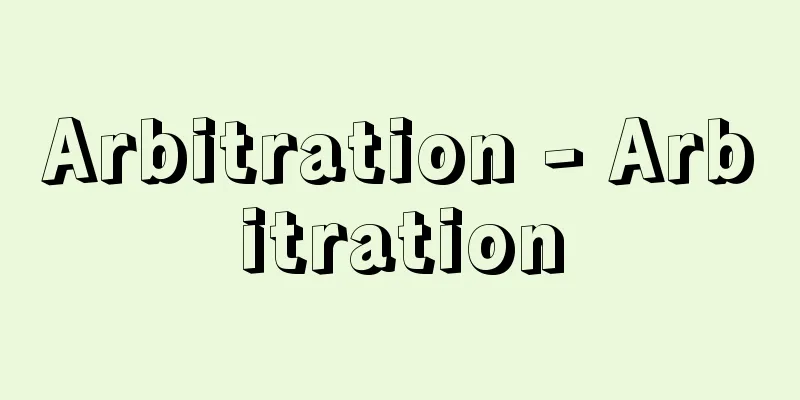Arbitration - Arbitration

|
The term "arbitration" is generally used in various cases as a method of resolving disputes by entrusting a decision on the dispute to a third party private party (arbitrator, arbitration committee, etc.) selected by the parties, promising to abide by the decision, and being bound by it. It is also used as a legal term in international law, civil law, labor law, etc. as a method of dispute resolution (see "International Trials" for international law). The provisions regarding arbitration procedures in the Civil Procedure Code were stipulated in Chapter 8 "Arbitration Procedures" of the old Civil Procedure Code (the Act of 1926), but have hardly been revised since the old Civil Procedure Code (the Act of 1890). Even when the Civil Procedure Code was completely revised in 1996, this article, along with Part 7 "Public Notice and Demand Procedures", was left unrevised, but was not included in the new Civil Procedure Code (Law No. 109 of 1996), and was preserved as Articles 764 to 805 of an independent law, the "Law Concerning Public Notice and Demand Procedures and Arbitration Proceedings" (Law No. 29 of 1890). However, a new Arbitration Act (Law No. 138 of 2003) was subsequently enacted to prescribe arbitration procedures, which remain in place to this day (the "Law Concerning Public Notice and Demand Procedures and Arbitration Proceedings" was renamed the "Law Concerning Public Notice and Demand Procedures" and was later abolished). [Takeyoshi Uchida and Tetsuo Kato] Arbitration as a means of resolving civil disputesArbitration procedures are procedures in which civil disputes that should be decided by a national judicial court are decided by an arbitral award by a private judicial institution instead of a court, based on the agreement of the parties, and therefore differ from other dispute resolution procedures in the following ways. First, the agreement of the parties is not necessary for the establishment of a judgment that serves as the basis for dispute resolution. In this respect, it differs from judicial settlement or mediation. Also, it differs from civil litigation in that the decision-making institution is not a court, which is a national institution, but an arbitrator, who is a private person selected by the parties. Therefore, arbitration awards are given the same effect as final judgments (Article 45, paragraph 1, main text of the Arbitration Act), but they are not the same in all respects, and arbitration awards cannot be immediately enforced. In order to enforce an arbitration award, a decision to allow enforcement must be made by a court, which is a national institution (Article 45, paragraph 1, proviso of the same Act). In addition, if an arbitration agreement exists between the parties for a given case, but the agreement is ignored and the case is brought as a civil lawsuit, the existence of the arbitration agreement becomes an obstacle to the lawsuit (a negative requirement for litigation), and the lawsuit will be dismissed as improper (Article 14, Paragraph 1, main text of the same Act). An arbitration agreement is an agreement to entrust the resolution of all or part of a dispute over private interests (civil dispute) to an arbitrator to which the principle of private autonomy applies, and to abide by the arbitrator's decision (Article 2, Paragraph 1 of the Arbitration Act). The agreement can cover both civil disputes that have already arisen and disputes that will arise in the future. Disputes that will arise in the future have the effect of waiving the right to sue, so they must be specified as certain legal relationships and disputes that arise from those relationships (Article 2, Paragraph 1 of the Arbitration Act), and arbitration agreements regarding all disputes that will arise in the future are invalid. In addition to the usual requirements for private law contracts, arbitration agreements are valid only if they concern civil disputes (excluding divorce or divorce disputes) which the parties are in principle able to settle (Article 13, Paragraph 1 of the Arbitration Act). The agreement must be in writing (Article 13, Paragraph 2 of the Arbitration Act). The procedures for the appointment of arbitrators shall be determined by agreement between the parties (Article 17, Paragraph 1, Main Text of the Arbitration Act). In cases where an agreement on the appointment procedures has been reached but the appointment is not made, one of the parties may petition the court for the appointment of an arbitrator (Article 17, Paragraph 1, proviso, Paragraphs 5 and 6 of the Arbitration Act). Furthermore, a party may challenge an arbitrator if there are certain grounds (Articles 18 and 19 of the Arbitration Act). The hearing to make an arbitral award shall be held in an arbitral tribunal consisting of one arbitrator or a panel of two or more arbitrators (Article 2, Paragraph 2 of the Arbitration Act; the method is described in Articles 32 and following). In principle, the law to be followed by the arbitral tribunal in making an arbitral award shall be determined by agreement between the parties (Article 36, Paragraph 1 of the Arbitration Act). An arbitral award (decision) must be prepared in writing (arbitral award document), and must state the reasons (Article 39, Paragraph 2 of the Arbitration Act), the date of preparation, the place of arbitration (Article 39, Paragraph 3 of the Arbitration Act), and be signed by the arbitrator (Article 39, Paragraph 1 of the Arbitration Act). If these requirements are not met, the arbitral award shall not be valid. Once an arbitral award has been established, it may be set aside by filing a suit for setting aside the arbitral award if there are certain circumstances, before the enforcement decision or until the enforcement decision is finalized (Article 44, Paragraph 2 of the Arbitration Act). The grounds for setting aside the award are limited to those listed in Article 44, Paragraph 1, Items 1 to 8 of the Arbitration Act. The unjustness of the award itself does not constitute a ground for setting aside the award. Arbitration agreements are often used as a method of resolving civil disputes, mainly in cases involving international commercial transactions. This is because, compared to civil litigation, arbitration procedures have the advantages of being simple and quick, which is required for resolving disputes in commercial transactions, and preventing the leakage of trade secrets by keeping the procedures confidential. It is also said that arbitration procedures avoid the uncertainty caused by the application of law, such as the determination of the governing law, which is unique to litigation in international cases, and that judgments based on the common trade practices of each country can be expected. [Takeyoshi Uchida and Tetsuo Kato] Arbitration in Labor LawArbitration is one of the procedures for adjusting labor-management disputes, along with mediation and conciliation. Arbitration differs from mediation and conciliation in that it entrusts the resolution of the dispute to a third party (arbitrator) other than the parties to the dispute, and seeks to resolve the dispute by necessarily following that party's decision (arbitration award). Once the parties to the dispute agree to mediation of the dispute through arbitration, they are bound by it without being asked whether they accept the content of the award or not. For this reason, arbitration procedures are, in principle, only initiated with the consent of both parties involved (voluntary arbitration). Compulsory arbitration, which is initiated based on an application by only one party involved or a resolution or request by an institution other than the parties involved (the Labor Commission, the governor, or the Minister of Health, Labor and Welfare), is exceptionally permitted for administrative execution corporations, etc. (Article 33 of the Law on Labor Relations of Administrative Execution Corporations, Article 15 of the Law on Labor Relations of Local Public Enterprises). In the case of arbitration conducted by the Labor Relations Adjustment Law, the arbitration committee is to be selected by agreement between the parties concerned from among the public interest commissioners or special adjustment commissioners, and the three arbitration commissioners are to be appointed by the chairman of the Labor Relations Adjustment Law. The arbitration committee will make a written arbitration award after investigating and deliberating the facts, including listening to the arguments of both sides. If the opinions of the three arbitration commissioners are divided into three opinions and none of them reach a majority, the arbitration award cannot be made and the arbitration will be terminated. The arbitration award made has the same effect as a labor agreement (Article 34 of the same law), and in order to clarify the contents and prevent the occurrence of disputes, it must be made in writing and the date on which the award will come into effect must be clearly stated (Article 33 of the same law). In Japan, mediation is by far the most commonly used adjustment procedure by the Labor Relations Commission, and arbitration is used even more rarely than conciliation. This is probably because, due to the nature of arbitration awards being binding on both labor and management without the need for the consent of both parties, people are reluctant to apply for arbitration due to concerns about what kind of award will be made. However, both labor and management may, based on their agreement, determine their own arbitration procedures in addition to the arbitration provided for by the Labor Relations Adjustment Act. [Hideo Kinoshita and Mikio Yoshida] [References] | | | | | | |Source: Shogakukan Encyclopedia Nipponica About Encyclopedia Nipponica Information | Legend |
|
仲裁の語は、一般に、当事者が選んだ第三者たる私人(仲裁人、仲裁委員会など)に紛争についての判断を任せて、その判断に服従することを約束し、それに拘束されることにより紛争を解決する方法として、さまざまな場合に用いられている。法律上の用語としても、国際法上、民事上、労働法上などの紛争解決の方法として使用されている(国際法上は「国際裁判」を参照)。なお、民事訴訟法上の仲裁手続に関する規定は、旧民事訴訟法(大正15年法をいう)中、その第8編「仲裁手続」に規定されていたが、旧旧民事訴訟法(明治23年法をいう)以来、ほとんど改正されることがなかった。1996年(平成8)の民事訴訟法の全面的改正にあたっても、第7編「公示催告手続」とともに、改正されずに残されることとなったが、新民事訴訟法(平成8年法律第109号)には入らず、独立した法律「公示催告手続及ビ仲裁手続ニ関スル法律」(明治23年法律第29号)の第764~805条として温存されていた。しかし、その後、新たに仲裁法(平成15年法律第138号)が制定され仲裁手続を規定し、今日に至っている(「公示催告手続及ビ仲裁手続ニ関スル法律」は、「公示催告手続ニ関スル法律」と改称し、その後廃止された)。 [内田武吉・加藤哲夫] 民事紛争解決手段としての仲裁本来は、国家の司法裁判所により判断されるべき民事上の紛争を、当事者の合意に基づいて、裁判所にかわる私的な裁判機関の仲裁判断により裁定するのが仲裁手続であるから、他の紛争解決手続とは次のような相違がある。まず、紛争解決の基準となる判断の成立のために当事者の合意は必要でない。その点で裁判上の和解や調停と異なる。また判断機関が国家機関たる裁判所ではなく、当事者により選定された私人たる仲裁人である点で、民事訴訟とは異なる。そこで、仲裁判断には確定判決と同一の効力が与えられている(仲裁法45条1項本文)が、すべての点について同一なのではなく、仲裁判断によってはただちに強制執行をすることはできない。強制執行のためには、国家機関としての裁判所によって執行を許す旨の執行決定を得たうえでなければ許されない(同法45条1項但書)。なお、当事者間に当該事件につき仲裁合意が存在するにもかかわらず、それを無視してその事件を民事訴訟による訴えとして提起したときは、仲裁合意の存在が訴訟上の障害(消極的訴訟要件)となって、起こされた訴えは不適法として却下される(同法14条1項本文)。 仲裁合意とは、私的自治の原則が妥当する私的利益に関する紛争(民事上の紛争)の全部または一部の解決を仲裁人にゆだねるとともに、その判断に服する旨の合意をいう(仲裁法2条1項)。すでに生じた民事上の紛争でも、将来において生ずる紛争でも合意の対象とすることができる。将来において生ずる紛争については、出訴権の放棄の効果が伴うから、一定の法律関係およびその関係から生ずる紛争に特定されることが必要であり(同法2条1項)、将来発生するすべての紛争に関する仲裁契約などは無効である。 仲裁合意は、通常の私法上の契約の要件のほかに、原則として当事者が和解をすることができる民事上の紛争(離婚または離縁の紛争を除く)を対象とする場合に限り有効である(仲裁法13条1項)。その合意は、書面によらなければならない(同法13条2項)。 仲裁人の選任手続は、当事者が合意により定めるところによる(仲裁法17条1項本文)。選任手続に関する合意があっても選任行為がなされない場合などには、一方の当事者は、裁判所に対し、仲裁人の選任を申し立てることができる(同法17条1項但書、5項、6項)。なお当事者は一定の事由がある場合には、仲裁人を忌避することができる(同法18条、19条)。 仲裁判断をするための審理は、1人の仲裁人または2人以上の仲裁人の合議体による仲裁廷において行われる(仲裁法2条2項。その方式については同法32条以下)。仲裁廷が仲裁判断において準拠すべき法は、原則として、当事者が合意により定めるところによる(同法36条1項)。仲裁判断(裁定)は書面(仲裁判断書)に作成され、理由(同法39条2項本文)、作成年月日、仲裁地(同法39条3項)の記載、仲裁人の署名のあることが必要であり(同法39条1項)、その要件を欠くときは、仲裁判断は成立しない。一度成立した仲裁判断に対して、執行決定前あるいは執行決定が確定するまでの間(同法44条2項)、特定の事由がある場合には、仲裁判断取消しの訴えにより取消しを求めることができる(同法44条)。取消事由は、同法第44条1項1号~8号に列挙されているものに限られる。判断自体の不当性は、取消事由にならない。 仲裁合意は、民事紛争を解決する方法として、国際商事取引に関する事件を中心に多く利用されている。それは、仲裁手続においては民事訴訟による場合と比較して、取引上の紛争解決に要求される簡易迅速性および手続の非公開による企業秘密の漏洩(ろうえい)防止などの利点があるからであり、また渉外事件訴訟に固有の準拠法決定など法適用による不安定を回避でき、各国共通の取引慣習に基づく判断が期待できるためといわれている。 [内田武吉・加藤哲夫] 労働法における仲裁斡旋(あっせん)、調停と並ぶ労使紛争の調整手続の一つ。仲裁は、斡旋、調停と異なり、紛争の解決を紛争当事者以外の第三者(仲裁委員)に一任し、その判断(仲裁裁定)にかならず従うことによって紛争解決を図る手続であり、紛争当事者は、いったん仲裁による紛争の調整に同意すると、裁定内容を受諾するか否か問われることなくこれに拘束される。このため仲裁手続は、原則として関係当事者双方の同意に基づいてのみ開始される(任意仲裁)。関係当事者の一方のみの申請や、関係当事者以外の機関(労働委員会や知事または厚生労働大臣)の決議や請求に基づいて仲裁が開始される強制仲裁は、行政執行法人などについて例外的に認められている(行政執行法人の労働関係に関する法律33条、地方公営企業労働関係法15条)。 労働委員会が行う仲裁の場合、仲裁委員は、公益委員または特別調整委員のなかから関係当事者が合意により選定した者につき、労働委員会の会長が指名するものとされ、この仲裁委員が3名で仲裁委員会を構成する(労働関係調整法31条、31条の2)。仲裁委員会は、双方の主張を聴くなど事実の調査および審議を行ったうえで、仲裁裁定を書面で作成する。仲裁委員3名の見解が3説に分かれ、いずれも過半数に至らないようなときは、仲裁裁定を作成することができず、仲裁は打ち切りとなる。作成された仲裁裁定は、労働協約と同一の効力を有するとされ(同法34条)、内容を明確にし、紛争の発生を予防する目的から、かならず書面に作成し、裁定の効力発生期日を明記しなければならないとされる(同法33条)。 日本では、労働委員会の調整手続のうちで活用されるのは斡旋が圧倒的に多く、仲裁は調停よりもさらにまれにしか利用されていない。これは、仲裁裁定が労使双方の同意を必要とせずに両者を拘束するという性質上、どのような裁定が出されるかを懸念して仲裁の申請に踏み切れないものと思われる。なお、労使双方が、合意に基づいて、労働関係調整法による仲裁とは別に、独自の仲裁手続を定めることもできる。 [木下秀雄・吉田美喜夫] [参照項目] | | | | | | |出典 小学館 日本大百科全書(ニッポニカ)日本大百科全書(ニッポニカ)について 情報 | 凡例 |
<<: Police station - Chuzaisho
>>: Monument to the deceased - Chukonhi
Recommend
Living Wage - Seikatsuchingin
A wage calculated based on the idea that wages sho...
Geogook - Igyeok
In shogi, this occurs when the king does not move ...
Palaiyakkaran (English notation) Palaiyakkaran
...Especially in the second half of the 16th cent...
Kleopatra Selēnē (English spelling) Kleopatra Selene
…After Octavian ascended to power, he was made ki...
California sea lion (English name: Zalophus californianus)
Order Carnivora, Suborder Pinnipedia, Family Otari...
Heresbach, C.
…Eventually, legumes (clover, lucerne) were culti...
Amagi azalea - Amagi azalea
A deciduous shrub of the Ericaceae family (APG cl...
Filibe
...After the invasion and destruction of the east...
Distribution theory - Bunpairiron
One of the main issues in economics is to clarify ...
Unchu County
…It has been a base for the nomadic tribes of the...
Nuta (bun) - Nuta
A type of salad. Tuna, squid, clams, and other she...
Amakusa Matsushima
Located in the southwestern part of Kumamoto Prefe...
Praying for a living - Ukeigari
…In the Kojiki and Nihon shoki myths, the act of ...
Saaz (English spelling) [Türkiye]
A Turkish plucked string instrument (illustration)...
Carmania
...Population: 350,000 (1994). Also called Kirman...









